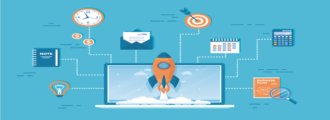Are you looking for a marketing automation solution that allows your organization to handle the entire buyer journey from prospect to customer, provide valuable insights into customer data, and build stronger customer relationships?
If so, Microsoft Dynamics 365 Marketing may be the tool for you.
Read on to learn more about Dynamics 365 for Marketing and where our Microsoft Dynamics consultants can help your organization maximize success.
What is Dynamics 365 Marketing?
Dynamics 365 Marketing is a marketing solution within the Microsoft Dynamics suite that enables embedded marketing automation, initiates target marketing objectives and drives sales efficiency and performance over time. It can be deployed as a standalone product or integrated within an existing technical landscape.
With this tool, a company’s marketing team can create and distribute out-of-the-box marketing campaigns across various channels and perform robust, targeted marketing tasks. Users can also leverage high-functioning marketing tools within the Dynamics Marketing solution to schedule events, track potential leads, and manage performance and activities at any given time.
This tool can facilitate more efficient data exchange between other applications in the Microsoft Dynamics 365 suite and beyond, as it offers pre-built integrations that make it easier to connect people, processes, and solutions across the entire ecosystem.
This allows marketing teams to improve collaboration and work together more effectively, meaning users can customize their digital marketing strategy to improve targeting tactics and drive more sales with potential leads.
Who Can Use Dynamics 365 Marketing?
Dynamics 365 Marketing is best suited for mid-sized businesses with adequate time and money to contribute to their internal marketing efforts, as it requires teams to navigate a comprehensive customer tracking system and complex application functions.
The D365 Marketing application is used most commonly for B2B and B2C marketing strategies; however, B2B marketing efforts typically reap the most significant benefits from the marketing solutions offerings and advanced customer targeting capabilities.
Features of Dynamics 365 Marketing
Here are some of the main features Dynamics 365 Marketing has to offer:
LinkedIn Integrations
Utilize Lead Gen Forms on LinkedIn to automatically sync leads directly from LinkedIn to an existing Dynamics 365 system. This way, internal marketing and sales teams can nurture potential leads, initiate personalized customer outreach, and promote more significant lead growth over time.
Multichannel Campaigns
Extend existing marketing campaigns and capabilities within D365 for Marketing to custom channels, like SMS or chat. The Dynamics Marketing solution also makes it easier for companies to attract the best leads from LinkedIn, web landing pages, emails, events, webinars, and more to improve overall lead success across the entire organization.
Landing Pages
Publish professional and aesthetically appealing landing pages to engage visitors, generate potential leads, and interact with contacts regardless of where they’re at in their buyer journey.
Event Management
Allow marketing teams to coordinate specific marketing events by keeping all the information about event venues, ticketing, logistics, sessions, sponsors, and speakers in the same place.
Insights
Empower users to stay informed with valuable marketing insights from real-time dashboards, notification alerts, and dynamic reporting capabilities.
Interactive, Automated Journeys
Target specific audience or marketing group segments with multi-step and multichannel marketing campaigns.
Objectives of Marketing Automation Software
Rather than dedicating organizational resources to mundane tasks like sending text messages, responding to emails, or creating social media posts, marketing automation capabilities in Microsoft Dynamics enable professional marketers to curate personalized workflows.
The main goal of automated marketing is to improve and streamline time-consuming marketing tasks over time and generate customized instructions for business-critical marketing initiatives.
By automating redundant manual tasks, companies can support high-quality, sales-ready leads and facilitate better connections across teams while also setting aside time to focus on more strategic, high-value work.
How Does Marketing Automation Work?
Automated marketing capabilities allow teams to implement efficient digital marketing strategies without manually performing each step in the implementation process.
Along with its time-saving benefits and core automation functions, D365 for Marketing can help optimize value from customer data and drive data-driven insights into what customers value most.
Features within each solution vary, but most marketing automation systems can help by offering the following functionality:
- Audience identity verification. Helps to find the appropriate audience for each marketing campaign to optimize the effectiveness of each target group or audience.
- Content design. Maintain consistent branding across multi-channel campaigns by leveraging artificial intelligence (AI) or prebuilt and customizable templates.
- Lead generation and qualification. Create personalized content that aligns customer segments with marketing initiatives to create more leads.
- Real-time lead scoring: Helps customers decide which leads are most likely to buy so sales teams can prioritize the most valuable business opportunities.
- Campaign delivery. Gain specific insights into customer behavior and campaign productivity to improve performance and automate the launch, management, and adjustment of core marketing campaigns.
- Workflows based on schedules and customer behaviors. Set up automated next steps, like text messages and follow-up emails triggered by customer actions.
- Demand generation. Helps curate, nurture, and gauge a prospect’s interest with lead and data management across various channels.
- Event management. Manage, plan, and coordinate virtual and in-person events to boost the impact and reach of your company’s marketing efforts.
What Automated Marketing Looks Like for the Customer
Content is either relevant to customer needs or it’s not. A one-size-fits-all marketing approach produces hit-or-miss results for customers, so every campaign is a risk.
Customized, relevant content ensures customers are given the highest chance for sales success. Engaging with a brand across channels, like email, mobile, or web-based campaigns, helps companies reduce friction during the buying journey. With automated marketing campaigns, it’s easier for customers to view the content they’re interested in and engage with areas of the company that are most relevant to them.
Managing customer experiences boosts lead outcomes and customer engagement from beginning to end, improving satisfaction and brand loyalty in the long run.
Benefits of Marketing Automation Software
Marketing automation software like Dynamics 365 for Marketing offers many benefits, including customizing marketing outreach and allowing more time to focus on strategic contributions.
Here are some of the main benefits of marketing automation software:
- Improved productivity. By automating time-consuming manual tasks, marketing automation software allows marketing teams to get more work done in less time.
- Increased ROI. Custom marketing campaigns produce more sales-ready leads and are more effective in improving returns on investment across the entire organization.
- Greater accuracy. By automating redundant tasks, reduce human error and ensure a high-quality, consistent experience across channels.
- Increase in engaged customers. Automated marketing functions improve customer loyalty and satisfaction through a seamless, customized customer experience.
- Relationship marketing. Offers a 360-degree view of market and customer trends to improve marketing efficiency and build stronger relationships with prospects.
- Better visibility into campaign performance. Marketing automation software leverages AI capabilities to magnify key performance metrics and help users improve process efficiency.
What are Dynamics 365 Customer Insights?
Dynamics 365 Customer Insights-Journeys leverages artificial intelligence (AI) and natural language processing (NLP) to help business users build trigger-based customer journeys. These journeys are designed to reach customers across multiple contact points and build long-term relationships with prospects.
Features on D365 Customer Insights
Here are some of the main features of Dynamics 365 Customer Insights:
Engage Customers in Real-Time
Organizations can provoke customer journeys in real time, pick the appropriate channel for each customer, and react to customer-led actions with trigger-based customer journeys.
Earn Customers and Loyalty Faster
By analyzing and working with all customer points of contact, real-time customer journeys offer an end-to-end experience for both customers and sales teams.
Create an Adaptable, Unified Platform
Customize and connect existing tools, processes, and platforms to easily and efficiently manage compliance regulations and accessibility guidelines.
Leverage AI for Personalized Customer Experiences
Utilize AI-driven recommendations for channels, content, and analytics to create actions and personalize customer experiences across the board.
How to Design a Marketing Automation Strategy
Marketing automation software doesn’t provide a one-size-fits-all solution to improve marketing success. Organizations should combine core automated marketing initiatives with an existing strategy considering all sales and marketing processes.
If you’re looking to add marketing automation to your marketing strategy, here are some key considerations:
- Plan out lead stages. It’s much easier to determine which actions will be most effective at each stage when a user maps out both prospect and lead nurturing stages.
- Create a lead scoring process. Users can easily prioritize sales resources and focus on opportunities with the highest chance of success.
- Create a lead qualification threshold. Setting a lead qualification threshold reduces wasted time and money on leads unlikely to generate sales.
- Plan the customer journey. Mapping out the customer journey allows users to understand the customer’s perspective and identify areas to improve the customer experience.
- Create a content library. Increase marketing options to personalize content for customers and generate relevant and engaging content.
- Take your time with the rollout. Implement marketing automation in different stages to help users optimize as they go.
- Make adjustments. Adjust the marketing automation process and identify improvements based on high-quality customer metrics.
How We Can Help
Whether you need help improving your organization’s personalized communications with a marketing automation solution like Dynamics 365 Marketing or you’re just looking for an extra hand getting started on your MicrosoftDynamics journey, Surety Systems can help.
Our senior-level Microsoft Dynamics consultants have the experience and skills to help your organization implement Microsoft Dynamics solutions successfully. Even better, our help goes beyond your go-live date to ensure your teams are supported from pre-implementation planning to go-live support, post-implementation assistance, and more.
Contact Us
Ready to learn more about D365 Marketing and where our senior Microsoft Dynamics consultants can fit in your organization?
Contact us today!




